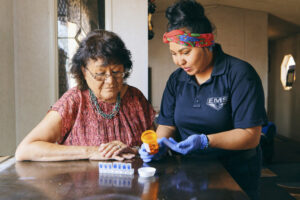Written by Helen Lewis
Social workers, particularly those with Master of Social Work (MSW) degrees, play a vital role in empowering vulnerable communities in North Carolina. These professionals are trained to address a wide range of social issues, including poverty, homelessness, substance abuse, and mental health.
In North Carolina, MSWs often collaborate with community organizations, government agencies, and healthcare providers. They engage in community development initiatives, advocating for policies that promote social justice and equity. These efforts can include facilitating access to education, employment opportunities, and affordable healthcare, breaking down barriers that contribute to the vulnerability of certain populations.
MSWs in North Carolina are instrumental in crisis intervention and recovery efforts. Whether social workers are responding to natural disasters or addressing the impacts of economic downturns, this workforce contributes to the resilience of communities by offering emotional support, coordinating emergency relief, and assisting in the rebuilding process. Through their commitment to social change and advocacy, MSWs in North Carolina are actively shaping a more inclusive and equitable future for vulnerable populations, emphasizing the importance of empowerment, resilience, and community collaboration in the pursuit of positive social outcomes.
Helping the Unhoused
Between 2020 and 2021, more than 1 million students in public schools in North Carolina were or had been unhoused—making up more than 2% of the entirety of all students between kindergarten and 12th grade.
Working with the homeless is a challenging, yet profoundly impactful, field within social work, addressing the complex and multifaceted issues that contribute to homelessness. Social workers in this arena are dedicated to providing support, advocacy, and resources to individuals and families experiencing homelessness, aiming to help them regain stability and access opportunities for a better life.
One primary focus is on establishing trust and building rapport with homeless individuals, recognizing their unique strengths and challenges.
Social workers working with the homeless population often engage in outreach efforts to connect with individuals living on the streets or in shelters. Through a person-centered approach, they assess immediate needs such as shelter, food, and healthcare, while also exploring the underlying factors contributing to homelessness, such as mental health issues, substance abuse, or economic hardships. This comprehensive understanding enables social workers to develop individualized plans to address both immediate and long-term needs.
Another crucial aspect of social work with the homeless involves navigating complex systems and advocating for access to essential services. Social workers often collaborate with shelters, healthcare providers, schools, and community organizations to ensure that homeless individuals and families can access housing, school supplies, transportation, school enrollment, mental health services, substance abuse treatment, and employment opportunities. They play a critical role in helping clients overcome barriers to accessing these services and empower them to take steps toward rebuilding their lives.
In addition to direct service provision, social workers working with the homeless contribute to advocacy efforts aimed at addressing systemic issues contributing to homelessness. This includes advocating for affordable housing, mental health services, and social policies that address the root causes of homelessness. By combining direct intervention with broader advocacy, social workers in this field work towards creating a more compassionate and supportive society that recognizes the dignity and worth of every individual, regardless of their housing status.
Gerontology and the Elderly
Social work with the elderly is a specialized and essential field that addresses the unique needs and challenges faced by older individuals. Social workers in this domain play a crucial role in enhancing the quality of life for older adults by providing support, advocacy, and resources. One primary focus of social work with the elderly is promoting healthy aging and ensuring that individuals can maintain independence, happiness, and dignity as they navigate the aging process.
 Social workers often engage in assessments to identify the specific needs of elderly clients, considering factors such as health, housing, financial stability, and social support systems. This holistic approach enables social workers to develop personalized care plans that address the individual’s physical, emotional, and social well-being. Additionally, social workers frequently collaborate with healthcare professionals, families, and community organizations to create a comprehensive support network for the elderly.
Social workers often engage in assessments to identify the specific needs of elderly clients, considering factors such as health, housing, financial stability, and social support systems. This holistic approach enables social workers to develop personalized care plans that address the individual’s physical, emotional, and social well-being. Additionally, social workers frequently collaborate with healthcare professionals, families, and community organizations to create a comprehensive support network for the elderly.
A key component of social work with the elderly involves addressing issues related to mental health and emotional well-being. Social workers provide counseling and emotional support to help older adults cope with life transitions, loss, and isolation. They also play a vital role in preventing and addressing elder abuse, advocating for the rights and safety of older individuals within various settings, including healthcare facilities and long-term care facilities.
As advocates for social justice, social workers in this field strive to influence policies that impact the elderly population. This includes advocating for improved healthcare services, affordable housing options, and elder-friendly community initiatives. By addressing the diverse needs of the elderly, social workers contribute significantly to promoting a society that values and respects the contributions of older individuals, fostering an environment where they can age with dignity and receive the support necessary for a fulfilling and meaningful life.
Social Work and Foster Care
Social work in the context of foster care is a critical and compassionate field that revolves around the well-being of children who, due to various circumstances, cannot live with their biological families.
According to the North Carolina Department of Health and Human Services, more than 11,500 children are currently in foster care state-wide. 39% of those children are under the age of 5.
Social workers in foster care play a pivotal role in ensuring the safety, stability, and overall development of at-risk children.
One primary responsibility involves conducting assessments to evaluate the needs of the child and the family, working collaboratively with various stakeholders to make informed decisions about placement and care.
Social workers in foster care act as children’s advocates, working diligently to ensure that they are placed in safe and nurturing environments. This may involve liaising with foster families, coordinating with child welfare agencies, and facilitating communication between biological parents and foster caregivers. The goal is to create a supportive and stable environment that promotes the child’s physical, emotional, and educational well-being.
In addition to managing the placement process, social workers in foster care are actively involved in providing counseling and support services to both foster children and their families. They play a crucial role in addressing trauma, facilitating reunification efforts when possible, and assisting with the transition to permanent placements, whether through reunification with biological families or adoption. The overarching objective is to ensure that children in foster care have the opportunity for healthy development and the chance to thrive despite the challenges they may face.
Furthermore, social workers in foster care engage in advocacy efforts to influence policies and practices that impact the welfare of children in the child welfare system. They work to enhance the system’s overall effectiveness and responsiveness, striving for positive outcomes for the children involved. Through their dedication and commitment, social workers contribute significantly to the well-being of vulnerable children and families, emphasizing the importance of stability, support, and the pursuit of permanency in the lives of those touched by foster care.
Disaster Relief and Response
Disaster relief and social work intersect in a crucial and impactful manner, as social workers play a vital role in addressing the psychosocial needs of individuals and communities affected by natural or man-made disasters. In the aftermath of a disaster, social workers are often among the first responders, providing immediate support and assistance. Their focus extends beyond material aid to addressing the emotional and mental well-being of survivors, helping them cope with trauma and navigate the complex process of recovery.
 One key aspect of disaster relief social work is the provision of crisis intervention and counseling. Social workers are trained to assess and respond to the psychological impact of disasters, offering emotional support to those who have experienced loss, displacement, or other traumatic events. This can involve individual or group counseling sessions, as well as community-wide psychoeducation initiatives to promote resilience and coping strategies.
One key aspect of disaster relief social work is the provision of crisis intervention and counseling. Social workers are trained to assess and respond to the psychological impact of disasters, offering emotional support to those who have experienced loss, displacement, or other traumatic events. This can involve individual or group counseling sessions, as well as community-wide psychoeducation initiatives to promote resilience and coping strategies.
Social workers also play a pivotal role in coordinating and mobilizing resources during disaster response efforts. They collaborate with various agencies, including government entities, non-profit organizations, and community groups, to ensure a comprehensive and effective response. Additionally, social workers engage in needs assessments to identify the specific challenges faced by individuals and communities, facilitating targeted interventions and resource allocation.
Furthermore, disaster relief social work extends beyond the immediate aftermath of a crisis. Social workers contribute to long-term recovery efforts by advocating for policies that address systemic vulnerabilities, enhance community resilience, and promote social justice. By integrating a social work perspective into disaster relief, professionals aim to not only rebuild physical infrastructure but also strengthen the social fabric of affected communities, fostering a sense of empowerment and collective support that is essential for sustainable recovery.
Becoming an MSW in North Carolina
Becoming a Master of Social Work (MSW) professional in North Carolina involves completing a comprehensive educational process.
Embarking on the journey to become a Master of Social Work (MSW) professional in North Carolina involves several key steps. Firstly, in order to be eligible for most programs, aspiring social workers should attain a Bachelor of Social Work (BSW) degree from a program accredited by the Council on Social Work Education (CSWE). Alternatively, individuals possessing a bachelor’s degree in a related field may be eligible for advanced standing MSW programs, provided they have completed relevant coursework in areas like psychology and sociology.
Following the completion of the undergraduate degree, the next step is to enroll in a CSWE-accredited MSW program.
North Carolina boasts a number of universities offering MSW programs.
Among these are UNC Chapel Hill, UNC Charlotte, North Carolina Central University, and North Carolina State University. Some colleges and universities in North Carolina offer the possibility of dual degree MSW programs, in which students can receive an additional master’s degree in subjects like Law, Public Health, City and Regional Planning, Divinity, and Public Administration.
Throughout the MSW program, students engage in fieldwork or internships to gain practical experience in diverse social work settings.
After successfully completing the MSW program, candidates must apply for licensure through the North Carolina Social Work Certification and Licensure Board. This process involves the submission of transcripts, documentation of field experience, and the requisite application fee. Subsequently, individuals are required to accumulate supervised post-master’s social work practice hours under the guidance of a licensed social worker.
The next crucial step in the licensure process is to pass the Association of Social Work Boards (ASWB) examination, a standardized test assessing the applicant’s knowledge and competence in social work practice. Once licensed, social workers must fulfill any continuing education requirements to stay abreast of evolving practices and maintain their licensure status in North Carolina. This comprehensive process ensures that MSW professionals are equipped with the necessary education, experience, and qualifications to make a meaningful impact in the field of social work.
Some particularly useful tips and tricks include:
- Ensure your BSW program is accredited by the Council on Social Work Education (CSWE).
- Select an MSW program with a concentration aligned with your career goals.
- Identify suitable field placement opportunities during your MSW program.
- Familiarize yourself with the North Carolina Social Work Certification and Licensure Board's requirements for licensure.
- Stay updated on any changes to licensure requirements or continuing education mandates in the state.
Do I need an MSW?
The need for a Master’s in Social Work (MSW) depends on the specific role and the level of responsibility associated with it. While there are entry-level positions in social work that may only require a Bachelor of Social Work (BSW) or a related undergraduate degree, obtaining an MSW significantly expands career opportunities and opens doors to advanced and specialized roles within the field.
Roles that often require an MSW include clinical social workers, therapists, and counselors. These professionals work in settings such as mental health clinics, hospitals, and private practices, providing therapy and counseling services. To diagnose and treat mental health conditions, an MSW, which involves additional coursework and supervised clinical experience, is typically required.
In contrast, certain entry-level positions, such as case manager or social services assistant, may be accessible with a BSW. These roles often involve working directly with clients, connecting them to resources, and providing support. However, as individuals progress in their careers and aim for more specialized or leadership positions, having an MSW becomes increasingly valuable.
In settings like schools, social workers may be employed as school counselors or school social workers. The latter often require an MSW, particularly when involved in providing clinical services or addressing complex emotional and behavioral issues among students. On the other hand, school counselors may have varied educational backgrounds, including an MSW, Master’s in Counseling, or related degrees.
In the realm of child welfare and foster care, social workers involved in case management and advocacy roles may enter the field with a BSW. However, those aspiring to clinical roles within this field, such as therapists working with foster children, would benefit from obtaining an MSW.
Similarly, in disaster relief and community development, social workers engaged in outreach, program coordination, and advocacy roles may enter with a BSW, while those involved in clinical or policy-related positions may find an MSW advantageous.
Overall, while a BSW may open the door to various entry-level social work positions, pursuing an MSW significantly expands the scope of opportunities, particularly in clinical, supervisory, and leadership roles. The decision to pursue an MSW depends on an individual’s career goals, the specific requirements of an individual’s chosen field, and the level of impact one seeks to achieve within the social work profession.






